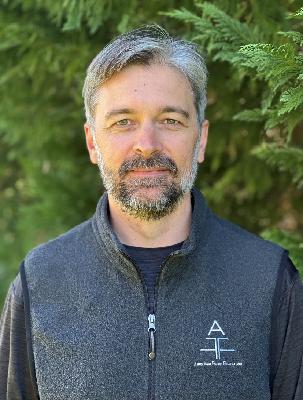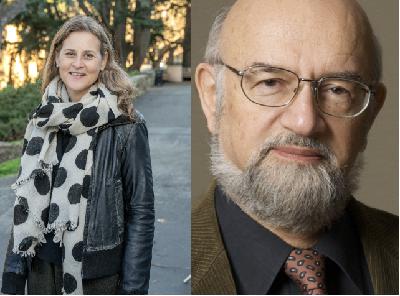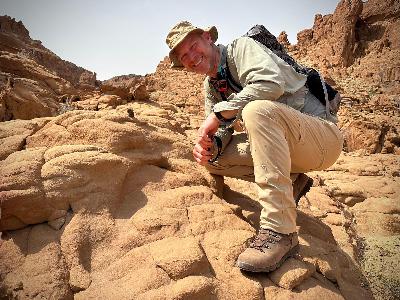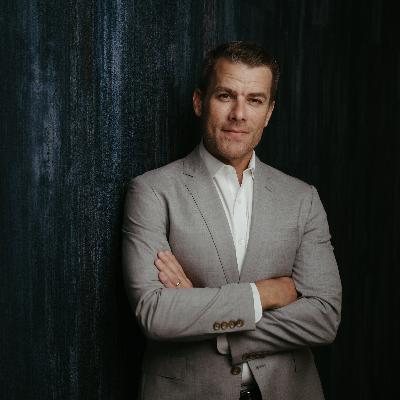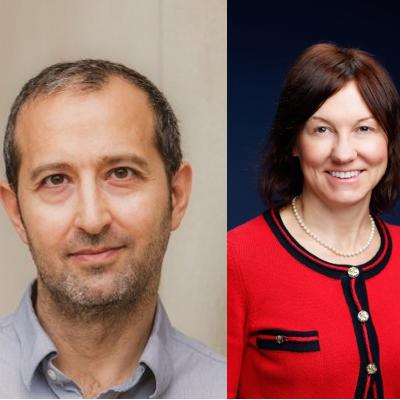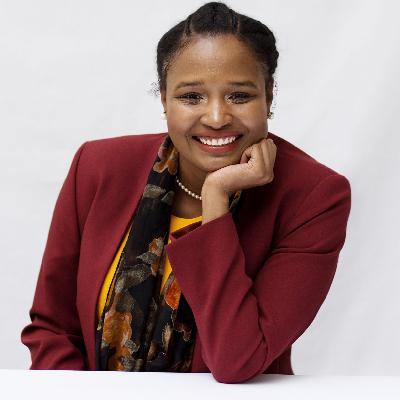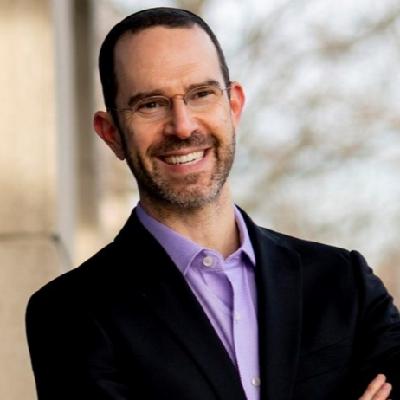Discover In Common
In Common

In Common
Author: The In Common Team
Subscribed: 58Played: 1,648Subscribe
Share
© Copyright 2019 All rights reserved.
Description
In Common explores the connections between humans, their environment and each other through stories told by scholars and practitioners. In-depth interviews and methods webinars explore interdisciplinary and transdisciplinary work on commons governance, conservation and development, social-ecological resilience, and sustainability.
238 Episodes
Reverse
In this episode, Divya chats with Pallavi Sethi, a Policy Fellow at the Grantham Research Institute on Climate Change & the Environment at the London School of Economics, where she works on climate misinformation and disinformation. Pallavi brings a unique perspective to this work, shaped by her background in advertising and media studies, as well as her experience in the fact-checking department for a large social media company. It was through these experiences that she began thinking more deeply about climate narratives and its influence on public perception.
At the beginning of their conversation, they discuss some fundamental questions, such as what is climate misinformation and disinformation, what fact-checking is and how it intersects with debates around free speech, and, lastly, who bears responsibility for the information we see and share.
A central thread in Pallavi’s work is her commitment to empowering the public — not just by calling for stronger platform governance, but by building media literacy and awareness so people can better recognize and challenge misleading climate narratives themselves.
Pallavi has done extensive work in this area and brings sharp and thoughtful insights to an incredibly complex issue. But what is truly commendable about her work is that it does not stop at diagnosis; it also points to meaningful responses, such as the media literacy programs for kids in Finland and the efforts of a climate coalition called Climate Action Against Disinformation.
Pallavi discussed the role of Climate Action Against Disinformation (CAAD), a coalition of over 90 organizations working to make the information sphere safer regarding climate information. She explained that CAAD's collective efforts have been instrumental in putting climate disinformation on the global agenda, with information integrity appearing on the provisional agenda at COP30 for the first time. She highlighted that CAAD's strength lies in its ability to bring together diverse voices, making it harder for governments to ignore their demands.
Sources:
Information on Pallavi's bio & background:
https://www.lse.ac.uk/granthaminstitute/profile/pallavi-sethi/
Sethi, P (2024). Kemi Badenoch’s climate scepticism: a growing problem for the Conservative Party and its voters in LSE Blogs.
Sethi, P., & Ward, B. (2024) Reform UK’s climate denial undermines democracy in LSE Blogs.
Sethi, P (2024). Why countering climate misinformation must be a priority in Global Government Forum.
Sethi, P. (2025). The myth of Meta’s free speech places democracy at risk in LSE Blogs.
Sethi, P (2025). Strategic Obstruction: How Europe’s Far-Right Parties Are Blocking Urgent Climate Action. https://hopenothate.org.uk/wp-content/uploads/2025/03/state-of-hate-2025.pdf
Sethi, P (2025). Inside Trump’s campaign to censor climate science. LSE Blogs
In this episode, Michael speaks with Nathan Truitt, Executive Vice President of Climate Funding for the American Forest Foundation. Nathan works in support of AFF's Family Forest Carbon Program, which it implements in collaboration with the Nature Conservancy. The program is designed to enable small-scale forest landowners to access carbon markets and credits. Together, Michael and Nathan talk about the goals of the program and how it meets the primary challenges that any such program faces, namely ensuring that real and lasting impacts on carbon storage and sequestration are made through the interventions that it supports.
References:
Nathan's background and bio: https://www.forestfoundation.org/who-we-are/people/nathan-truitt/
More information about the Family Forest program: https://www.forestfoundation.org/why-we-do-it/family-forest-blog/
More information about the permanence trust: https://www.forestfoundation.org/permanence-trust/
In this episode, Xavier Basurto, a former guest of the show, joins Michael to interview Fikret Berkes and Nicole Franz. Fikret is Distinguished Professor Emeritus at the Natural Resources Institute of the University of Manitoba. He is a legend in the field of the commons and social-ecological systems, with some of his most well-known works included Sacred Ecology, Coasts for People, and Navigating Social-ecological Systems. Nicole is a Research Scholar at the Center for Ocean Solutions at Stanford University. She has over two decades of experience working in intergovernmental organizations, namely the UN Food and Agriculture Organization (FAO) and the International Fund for Agricultural Development in Rome as well as the Organization for Economic Cooperation and Development in Paris
Michael asks Nicole and Fikret’s about their new edited book entitled Governing for transformation towards sustainable small-scale fisheries, which is open access and published by the FAO. The book was written in support of the FAO's Voluntary Guidelines for Securing Sustainable Small-Scale Fisheries, and provides a human-centered, interdisciplinary approach to managing fisheries in a complex world. It addresses challenges like climate change, biodiversity loss, pollution, and privatization by advocating for a shift from top-down, single-species management to cooperative, adaptive governance systems that incorporate the knowledge and needs of resource users. During the interview, Michael and Xavier also take the time to discuss Fikret’s long career as a key contributor to the literatures on the commons, social-ecological systems and small-scale fisheries governance.
References:
FAO. 2015. Voluntary Guidelines for Securing Sustainable Small-Scale Fisheries in the Context of Food Security and Poverty Eradication. Rome. https://openknowledge.fao.org/handle/20.500.14283/i4356en
Berkes, F. & Franz, N. eds. 2025. Governing for transformation towards sustainable small-scale fisheries. Rome, FAO. https://doi.org/10.4060/cd4289en
Website of the Voluntary Guidelines for Securing Sustainable Small-Scale Fisheries in the Context of Food Security and Poverty Eradication. https://www.fao.org/voluntary-guidelines-small-scale-fisheries/en/
In this episode, Divya speaks with Sean Fox and Gregory Randolph about urbanization and how it is unfolding amid global shocks and affecting inequality.
Sean Fox is a Professor of Geography and Global Development at the University of Bristol. His research focuses on the causes and consequences of global urbanization, the political economy of urban governance, and sustainable city futures.
Gregory Randolph is an Assistant Professor in the School of City and Regional Planning at Georgia Tech. His work focuses on how local economies and urbanization patterns are being reshaped by 21st-century transitions namely technological, energy and demographic transitions, with a particular focus on inequality.
Together, Sean and Gregory offer rich interdisciplinary insights that challenge conventional understandings of urbanization, showing that urbanization is not just about the growth of cities or a straightforward shift from rural to urban. Rather, it's a geo-demographic transformation that is deeply embedded in political, social, and economic processes.
The conversation also sheds light on the hidden stories of urbanization in the global south for example, the stories of migration in the indian state of Bihar where Gregory has been working, deindustrialization, regional divergence, and the hollowing out of labor markets and how these processes contribute to interpersonal and inter-place inequalities.
This episode was recorded at a time when massive wildfires in Los Angeles were making headlines everywhere, prompting a timely question for our guests: What should planners be thinking about as they rebuild cities after disasters?
Both Sean and Gregory voiced serious concern about the increasing frequency and scale of natural disasters and how such events are amplifying pre-existing inequalities. They emphasized that recovery and rebuilding cannot be the task of planners alone. It must also be a political project—one that demands bold, inclusive, and forward-thinking political leadership committed to building cities that account for vulnerability, address structural inequalities, and prioritize resilience for all.
Sean and Gregory are both compelling storytellers, and their work offers a grounded and timely lens on how urbanization is evolving in a world marked by rising uncertainties and deepening inequalities, and I am extremely grateful to have had the opportunity to engage with them and their brilliant & relevant scholarship
References:
Fox, S., & Goodfellow, T. (2022). On the conditions of ‘late urbanisation’. Urban Studies, 59(10), 1959-1980.
Randolph, G. F., & Currid-Halkett, E. (2022). Planning in the era of regional divergence: place, scale, and development in confronting spatial inequalities. Journal of the American Planning Association, 88(2), 245-252.
Randolph, G. F., & Storper, M. (2023). Is urbanisation in the Global South fundamentally different? Comparative global urban analysis for the 21st century. Urban Studies, 60(1), 3-25.
Fox, S., & Wolf, L. J. (2024). People make places urban. Nature Cities, 1(12), 813-820.
Fox, S., Agyemang, F., Hawker, L., & Neal, J. (2024). Integrating social vulnerability into high-resolution global flood risk mapping. Nature communications, 15(1), 3155.
Randolph, G. F. (2024). Does urbanization depend on in-migration? Demography, mobility, and India's urban transition. Environment and Planning A: Economy and Space, 56(1), 117-135.
Randolph, G. F., & Deuskar, C. (2024). Urbanization beyond the metropolis: Planning for a large number of small places in the global south. Journal of Planning Education and Research, 44(1), 279-291.
Randolph, G. F. (2025). Planning the “Ruralopolis” in India: Circular Migration, Survival Entrepreneurship, and the Subversive Non-Farm Economy. Journal of Planning Education and Research, 45(2), 305-317.
In this episode, Michael speaks with Rachelle Gould, Associate Professor at the Rubenstein School of Environment and Natural Resources and an Environmental Fellow at the Gund Institute at the University of Vermont.
Rachelle is a prominent and productive scholar on several topics, and one of the main ones she has written about is relational values, which were introduced to represent a different way of relating to the environment that hadn’t been expressed by the more traditional dichotomy of intrinsic and extrinsic value. Relational values have become very popular within academia and have become a focal point of publications by the The Intergovernmental Science-Policy Platform on Biodiversity and Ecosystem Services, or IPBES, which Rachelle describes as the IPCC for Biodiversity. Rachelle was also a Lead Author on the recent IPBES Values Assessment.
During their conversation, Michael asks Rachelle about some concerns he has about relational values, primarily that it seemed to be so popular that it was becoming a way of labeling anything that we like as relational, and secondly, that it had become a new panacea: something that doesn’t present trade-offs but which we should simply want more of, regardless of context. They discuss these concerns as well as the significant value that Rachelle sees in a concept that can better represent how human beings can and do relate to the natural world.
References:
Routledge Handbook of CES and Rachelle's critiques chapter
IPBES Transformative Change Summary for policymakers
IPBES Values Assessment
West et al. relational turn paper
Gould et al. response focused on Indigenous relationality
Gould et al. response focused on Latin American relationality
Muraca’s original relational values paper
“Key to pluralistic valuation” Himes and Muraca 2018
Hoelle et al Relational values desirability paper
Spash tribute critiques of monetary valuation
Pratson relational values review
Relationality is not WEIRD paper
In this episode, Divya speaks with Saad Gulzar, Associate Professor of Political Science and Global Affairs at the University of Notre Dame. At the time of recording of this episode, he was at Princeton University and has since moved to Notre Dame.
Gulzar’s research focuses on the politics of development in South Asia and centers on a critical question: How can governments deliver better outcomes for their citizens? His work combines randomized control trials, administrative data, and in-depth qualitative insights to examine how political representation and bureaucracies can become more responsive. The conversation explores Gulzar’s research on the relationship between politicians and bureaucrats, and the conditions under which their collaboration leads to more effective governance.
Gulzar’s findings highlight how the everyday decisions and motivations of these key actors shape the design and delivery of public policy. By uncovering these dynamics, his work offers valuable insights into how governments can better align expectations and improve the delivery of services in people's daily lives.
References:
Gulzar, S., Pathak, D., Thompson, S., & Toth, A. (2025). Can Party Elites Shape the Rank and File? Evidence from a Recruitment Campaign in India. American Political Science Review, 119(2), 812-831.
Gulzar, S., & Khan, M. Y. (2025). Good politicians: Experimental evidence on motivations for political candidacy and government performance. Review of Economic Studies, 92(1), 339-364.
Gulzar, S. (2021). Who enters politics and why?. Annual Review of Political Science, 24(1), 253-275.
Gulzar, S., & Pasquale, B. J. (2017). Politicians, bureaucrats, and development: Evidence from India. American Political Science Review, 111(1), 162-183.
In this episode, Divya speaks with Scott Hardy. Scott is an Extension Educator with the Ohio Sea Grant College Program, where he leads research and runs education and outreach programs on watershed restoration, coastal zone management, and stormwater runoff. He is also an Adjunct Associate Professor of Earth, Environmental, and Planetary Sciences at Case Western Reserve University, where he works on several research projects.
Scott’s work is all about collaboration — bringing people together to solve problems that no one can tackle alone. He knows that collaboration isn’t automatic. It takes time, trust, and spaces where people feel heard and included. He also believes that every place is different, and you need to really understand the local context to make teamwork work. Different projects need different kinds of partnerships, and Scott is skilled at figuring out what each situation needs.
In this episode, they talk about Scott’s ongoing work on Cuyahoga River restoration, where he has been closely collaborating with a wide range of stakeholders ranging from state agencies to industry to local communities. They also talk about his recent experience as a Fulbright Specialist at the Universidad de Atacama in Copiapó, Chile, where he was invited to share his expertise on sustainable water management.
References:
Hardy, S. D. (2022). Power to the people: Collaborative watershed management in the Cuyahoga River Area of Concern (AOC). Environmental Science & Policy, 129, 79-86.
Hardy, S. D. (2022). Transaction costs for collaboration in the watershed management of the Cuyahoga River Area of Concern. Regional Sustainability, 3(2), 146-156.
https://u.osu.edu/hardy.116/
Koontz, T. M. (2002). Federalism in the forest: National versus state natural resource policy. Georgetown University Press.
In this episode, Michael speaks with Nate Dominy, the Charles Hansen Professor of Anthropology at Dartmouth College. Nate is a biological anthropologist and an evolutionary biologist, studying the behavior, ecology, and functional morphology of humans and nonhuman primates. Nate speaks with Michael about his new research program on the role of fire in promoting social cohesion among humans. Fire is argued to have played an important role in human evolutionary history, and there are multiple mechanisms that have been hypothesized for how it could promote cohesion, including its rhythmic nature (its flicker rate), and its ability to enable storytelling, which itself is known to facilitate an increased sense of belonging and togetherness. This topic is an important complement to more traditional commons and institutional studies discussed on this podcast, which largely focus on how rules and norms can promote collective action and other outcomes.
References:
Nate’s website: https://anthropology.dartmouth.edu/people/nathaniel-j-dominy
Dunbar R.I.M., Gowlett J.A.J. 2014 Fireside chat: the impact of fire on hominin socioecology. In Lucy to Language: The Benchmark Papers (eds. Dunbar R.I.M., Gamble C., Gowlett J.A.J.), pp. 277–296. Oxford, Oxford University Press.
Lynn C.D. 2014 Hearth and campfire influences on arterial blood pressure: defraying the costs of the social brain through fireside relaxation. Evolutionary Psychology 12(5), 983-1003. (doi:10.1177/147470491401200509).
Wiessner P.W. 2014 Embers of society: firelight talk among the Ju/’hoansi bushmen. Proceedings of the National Academy of Sciences USA 111(39), 14027-14035. (doi:10.1073/pnas.1404212111).
In this episode, Michael speaks with Maron Greenleaf, assistant professor of anthropology at Dartmouth College. They discuss Maron’s recently published book, Forest Lost: Producing Green Capitalism in the Brazilian Amazon, in which she examines a set of carbon offset programs in the Brazilian state of Acre. Unlike traditional forest commodities that require extraction, carbon offsets monetize forest protection by paying communities to keep carbon stored in standing trees. Based on extensive ethnographic fieldwork, Maron describes how forest carbon markets and offsets can be unexpectedly inclusive, providing economic opportunities for marginalized communities, while simultaneously reinforcing some of the inequalities they claim to address. Maron uses this study to illuminate broader questions about whether market-based solutions can effectively address environmental crises. Her work suggests that while green capitalism offers compelling possibilities for reconciling economic growth with environmental protection, it also reproduces some of the structural problems inherent in capitalist systems.
References:
Maron’s website: https://www.marongreenleaf.com/forest-lost
Greenleaf, M. (2024). Forest Lost: Producing Green Capitalism in the Brazilian Amazon. Duke University
Press. https://dukeupress.edu/forest-lost
Ferguson, J. (1994). The anti-politics machine:’development’, depoliticization and bureaucratic power in
Lesotho. University of Minnesota Press.
Ferguson, J. (2015). Give a Man a Fish: Reflections on the New Politics of Distribution. Duke University Press.
In this episode, Michael speaks with Jake Kheel, Vice President of Sustainability at the Grupo Puntacana Foundation, a non-profit organization located in the Dominican Republic. The Foundation is funded in large part by Grupo Puntacana, a major tourism company in Punta Cana, which is the most well-known tourism destination in the DR. As background, Michael met Jake some years ago through Michael's longtime collaborator, Freddie Payton, who runs the Dominican NGO AgroFrontera in the province of Montecristi on the other side of the country.
Jake and Michael discuss Jake’s 2021 book, Waking the Sleeping Giant: Unlocking the Hidden Power of Business to Save the Planet. In the book Jake describes his experiences working in Punta Cana, and the efforts that he and his colleagues have made to address numerous social and environmental issues, including overfishing, coral degradation, invasive seaweed, waste disposal, and water management. Jake and Michael discuss the reasons behind the successes of the Foundation, including the presence of local champions who invest in a particular place and its problems for the long term, which may be less glamorous but is critical for enduring success.
References
Jake’s website: https://www.jakekheel.com/
Kheel, J. 2021. Waking the sleeping giant : unlocking the hidden power of business to save the planet. Lioncrest Publishing.
In this episode, Divya interviews Usman Ashraf, a PhD student at the Helsinki Institute of Sustainability Sciences at the University of Helsinki. His research focuses on forest governance and the complexities of the implementation of development policies in Pakistan. This discussion centers around Usman’s report on Pakistan’s ambitious "10 Billion Tree Tsunami" project, titled "Participation and Exclusion in a Mega-Tree Planting Project in Pakistan." The conversation explores how this massive reforestation initiative, aimed at combating climate change, has inadvertently disrupted the lives and livelihoods of the nomadic herder communities in the Khyber Pakhtunkhwa province.
Usman explains how the long-standing relationship between Pashtun landowners and the nomadic goat-herding communities has been disturbed by government incentives to plant trees, fundamentally altering these traditional dynamics. This episode goes beyond academic discussion to provide a deep dive into the real-world implications of climate mitigation projects on marginalized communities. Usman’s ethnographic insights reveal how large-scale plantation projects, often driven by political motives, can have significant ecological, social, and economic consequences.
Overall, the conversation highlights the complexities of such initiatives in the Global South, emphasizing the need to consider both ecological and socio-economic factors to ensure that development projects are genuinely sustainable and equitable.
In this final episode in our series on the future of fisheries management, Michael speaks with two of the co-organizers of the initial meeting that led to this series. Ilia Murtazashvili is a professor in the Graduate School of Public and International Affairs at the University of Pittsburgh, where he also serves as the Associate Director at the Center for Governance and Markets. Christine McDaniel is a Senior Research Fellow at the Mercatus Center at George Mason University, which also has a central focus on markets and society.
Each guest discusses their respective careers and the academic centers where they work. Ilia introduces the concepts of polycentricity and polycentric governance and their relationship to large-scale commons dilemmas such as overfishing, while Christine helps to explain the role of the World Trade Organization in fisheries policy through its rules and fishing subsidies, which has been a central topic throughout this podcast series.
To conclude this series, we want to thank Garret Brown at the Mercatus Center, where he is the Senior Director for Publications. Garrett was on the zoom call for this interview and you’ll hear him mentioned him a few times.
In this episode, Stefan speaks with Brendan Coolsaet.
Stefan and Brendan discuss the history of environmental justice movements and scholarship, current frameworks, critical reflection on the field, transdisciplinary approaches, and the links the field has to activism. The also discuss environmental justice in the context of differen regions.
Brendan Coolsaet is a tenured Research Associate with the Belgian Fund for Scientific Research and a Research Professor at UCLouvain in Belgian. He is also the current Chair of the JUSTES research group on social and ecological justice, and an organizing committee member of the French Environmental Justice network.
Brendan refers to himself as an environmental social scientist studying environmental (in)justice in Europe. His research projects have focused on justice issues posed by the governance of agricultural biodiversity, the conservation of protected areas, the intensification of land-use changes, and the transformation of rural landscapes in Europe. He has also focused on diversifying the field of environmental justice research, both conceptually (beyond liberal approaches) and geographically.
https://brendan.coolsaet.eu/
This is the fifth episode in our future fisheries management series, which we are running in collaboration with the Mercatus Center at George Mason University and the Center for Governance and Markets at the University of Pittsburgh.
Today’s guest, Kerrlene Wills, participated in the negotiation process for the 2022 World Trade Organization (WTO) agreement on fishing subsidies as a representative of the nation of Guayana, and has written about the resulting agreement. This is primarily aimed towards curbing subsidies for what is known as illegal, unreported and unregulated (IUU) fishing. It also tried curb the fishing of over-depleted populations, and vessels fishing on the unregulated high seas. A point that Kerrlene makes is that not all subsidies are the same, and therefore should not be subject to the same rules and constraints. The main category that Kerrlene highlights are subsidies that developing countries give to small-scale fishers, which are important for local livelihoods and which don’t necessarily lead to overfishing through overcaptilazition.
Kerrlene is currently the director of Ocean and Climate at the UN Foundation, and she discusses her current work with Michael, in which she is involved in efforts to decarbonize the global transportation industry trough some type of pricing mechanism along the lines of a carbon tax or a cap and trade scheme.
Resources:
Kerrlene’s website at the UN Foundation: https://unfoundation.org/author/kerrlene-wills/
Kerrlene’s article on fisheries subsidies: https://papers.ssrn.com/sol3/papers.cfm?abstract_id=4607279
WTO agreement on fisheries webpage: https://www.wto.org/english/tratop_e/rulesneg_e/fish_e/fish_e.htm
Guardian piece about the WTO agreement: https://www.theguardian.com/environment/2022/jun/21/first-wto-deal-on-fishing-subsidies-hailed-as-historic-despite-big-holes
In this episode, Michael speaks with Alex Smalley, an expert in Environmental Psychology and researcher at the University of Exeter. Alex’s research program explores, in his words, “the cognitive and emotional impacts of virtual encounters with the natural world”. He has collaborated extensively with the BBC in the UK, including in the creation of a wonderful podcast entitled “The Healing Power of Nature”.
An important take-away from Alex’s work is that virtual experiences with nature can have a positive impact on our well-being, and that this effect is stronger for those with previous experiences with the natural environment itself. This undelies another important lesson, that virtual experiences in nature should be seen as an important complement of but not a substitute for the real world. But with many of us spending most of our time indoors, such a complement can prove to be very important, as Alex explains during the interview.
References:
Alex’s website: https://medicine.exeter.ac.uk/people/profile/index.php?web_id=Alexander_Smalley
Audible podcast: https://www.audible.com/podcast/The-Healing-Power-of-Nature/B0CLW481KM
Smalley, Alexander J., Mathew P. White, Rebecca Ripley, Timothy X. Atack, Eliza Lomas, Mike Sharples, Peter A. Coates, et al. 2022. “Forest 404: Using a BBC Drama Series to Explore the Impact of Nature’s Changing Soundscapes on Human Wellbeing and Behavior.” Global Environmental Change: Human and Policy Dimensions 74 (May): 102497. https://doi.org/10.1016/j.gloenvcha.2022.102497.
Smalley, Alexander J., Mathew P. White, Rebecca Sandiford, Nainita Desai, Chris Watson, Nick Smalley, Janet Tuppen, Laura Sakka, and Lora E. Fleming. 2023. “Soundscapes, Music, and Memories: Exploring the Factors That Influence Emotional Responses to Virtual Nature Content.” Journal of Environmental Psychology 89 (August): 102060. https://doi.org/10.1016/j.jenvp.2023.102060.
In this episode, Michael talks with Marty Anderies, Professor in the School of Sustainability at Arizona State University.
They discuss a book that Marty co-authored with Marco Janssen, a colleague of his at Arizona State, entitled Infrastructure for Sustainability. The book is designed to introduce readers to the work of Elinor “Lin” Ostrom and her colleagues on the role of institutions in shaping behavior. Ostrom pioneered the study of institutions, particularly in context of the self-governance of resource-dependent communities. Marty discusses Lin’s work and the role that she played in his career.
The book also introduces readers to the work of Buzz Holling and his colleagues on the resilience of complex systems. Resilience is an important boundary concept, being used by multiple fields to describe the ability of a system to “bounce back” and sustain itself in a particular regime or state. It is related to but distinct from the idea of robustness, which relates the ability to maintain a desired system function in the face of disturbance and uncertainty. In the last half of the conversation, Michael and Marty try to unpack what these terms mean and how they can and should be used to understand our relationships with each other and the natural environment.
Finally, Marty also talks about the importance of the term infrastructure, which is similar to but different from the idea of capital as many people use it. In describing his preference for infrastructure, Marty has provided this quotation from Bowles and Gintis (2005) that has influenced his thinking:
"Perhaps social capital, like Voltaire’s God, would have to have been invented had it not existed. It may even be a good idea. It is not a good term. Capital refers to a thing that can be owned—even a social isolate like Robinson Crusoe had an axe and a fishing net. By contrast, the attributes said to make up social capital describe relationships among people. ‘‘Community’’ better captures the aspects of good governance that explain social capital’s popularity, as it focuses attention on what groups do rather than what people own" (Bowles and Gintis, 2005, p. 381).
References:
Bowles, S., & Gintis, H. (2005). Social capital, moral sentiments, and community governance. In Gintis, H., Bowles, S., Boyd, R., and Fehr, E., eds. Moral sentiments and material interests: The foundations of cooperation in economic life. Vol. 6. MIT press.
Janssen, M., and Anderies, J.M. 2023. Infrastructure for Sustainability. https://pressbooks.pub/cisi/
This is the fourth episode in our Future Fisheries Management series, which we are running in collaboration with the Mercatus Center at George Mason University and the Center for Governance and Markets at the University of Pittsburgh.
In this episode, Michael speaks with Andrew Johnson, the CEO of MarFishEco, a consultant-based organization that provides advice and support for the future of sustainable, profitable fisheries. Andrew founded MarFishEco based on his experience with short term environmental consultancies that, in his terms, he felt were delivered "quickly but often without the rigor of academic research".
During the interview they discuss Andrew’s experience moving into and out of academia and his lessons from founding and running a consulting organization that brings theoretical and applied expertise to conservation challenges. And like each of the other guests in this series, Michael asks Andrew about the World Trade Organization’s role in fisheries policy through it’s recent agreements to limit the role of subsidies in this sector. This conversation is a bit dated now as since the time of recording, as the WTO has had a subsequent meeting on subsidies that is not reflected in our conversation. Check out the WTO's website for up-to-date information.
References:
Andrew’s website: https://www.marfisheco.com/
Website for WTO subsidy agreements: https://www.wto.org/english/tratop_e/rulesneg_e/fish_e/fish_e.htm
In this episode, Michael speaks with Stephen Posner, the Director of Pathways to Planetary Health at the Garrison Institute. The Garrison Institute is located in Garrison, New York along the Hudson River. Its mission is to apply the skills and wisdom cultivated through contemplative practice, together with the insights emerging from science, to today’s urgent social and environmental challenges, leveraging transformational change and helping build a more compassionate, resilient future.
Stephen obtained his PhD in Natural Resources from the University of Vermont in 2015, and has maintained an active research program that among things has focused on the role of boundary spanners, or organizations that are able to bridge gaps between groups and perspectives. Stephen’s answer to the question, what makes a good boundary spanner, emphasizes the importance of what he calls “self attention work” and developing a self-awareness of the reasons behind one’s own actions. Stephen also speaks about the importance of contemplative practice which is a major theme of the Garrison institute, and the importance of combining contemplation with action.
References:
Posner, S., Fenichel E.P., McCauley, D.J., et al. 2020. Boundary spanning among research and policy communities to address the emerging industrial revolution in the ocean. Environmental Science and Policy 104: 73-81.
Neal, J., Posner, S., Brutzman, B. 2021. Understanding brokers, intermediaries, and boundary spanners: a multi-sectoral review of strategies, skills, and outcomes. Evidence & Policy.
Stephen’s recent blog entry on combining inner and outer change: https://www.garrisoninstitute.org/blog/integrating-inner-and-outer-systems-change/
Metamorphosis event page: garrisonmetamorphosis.org
In this episode, Stefan speaks with Daniel Aldrich. Daniel is a Professor of Political Science and Public Policy at Northeastern University in Boston. He received his PhD from Harvard University, and has published over 70 peer-reviewed articles and 5 books on topics related to social capital and community resilience in relation to disaster risk reduction, with a focus on public policy. He has been referred to as a ‘social capitalist’ given his wide ranging research and writing showing the value of building social capital with public policy and the essential role social capital plays in avoiding disasters caused by natural hazards.
In the episode we discuss Daniel’s personal experience having to evacuate his family during Hurricane Katrina in New Orleans in 2005, and the role that neighbors and informal networks played in helping his family navigate the loss of their home, and the role that government and markets did not play. We then discuss what the concept of social capital is, how to measure it effectively with inter-disciplinary methods and how public policy interventions can proactively build social capital in at-risk communities.
Daniel’s institutional profile page
https://cssh.northeastern.edu/faculty/daniel-aldrich/
In this episode, Stefan speaks with Josephine Chambers. Josie is an Assistant Professor at Utrecht University in the Netherlands, situated within the Urban Futures Studio at the Copernicus Institute of Sustainable Development. Her research develops and examines approaches to questioning so-called ‘inevitable’ unjust futures and fostering collective imagination and agency towards more just and sustainable societies. She weaves together artistic, participatory, imaginative, decolonial concepts to collaboratively explore possibilities for transformative changes with diverse societal groups.
In the podcast, they speak about two papers Josie and colleagues published analyzing co-production research, one titled ‘Six modes of co-production for sustainability’’ published in Nature Sustainability and the other titled ‘Co-productive agility and four collaborative pathways to
sustainability transformations’ published in Global Environmental Change. They also discuss the role of creativity in science, and how linking art, creativity and science has potential to extract pluralistic sustainability narratives for just futures. Josie also explains how she brings her knowledge and passion for co-production and creativity into the classroom to reshape learning and student engagement.
Six modes of co-production for sustainability
https://www.nature.com/articles/s41893-021-00755-x?utm_campaign=related_content&utm_source=HEALTH&utm_medium=communities
Co-productive agility and four collaborative pathways to sustainability transformations
https://www.sciencedirect.com/science/article/pii/S0959378021002016
Josie’s ‘Urban Pulses’ blog
https://www.uu.nl/en/research/urban-futures-studio/initiatives/blog-utopian-pulses
Josie’s ‘Map of Rural Utopias’
https://www.uu.nl/en/research/urban-futures-studio/initiatives/techniques-of-futuring-a-mixed-classroom-with-policymakers/rural-utopias



